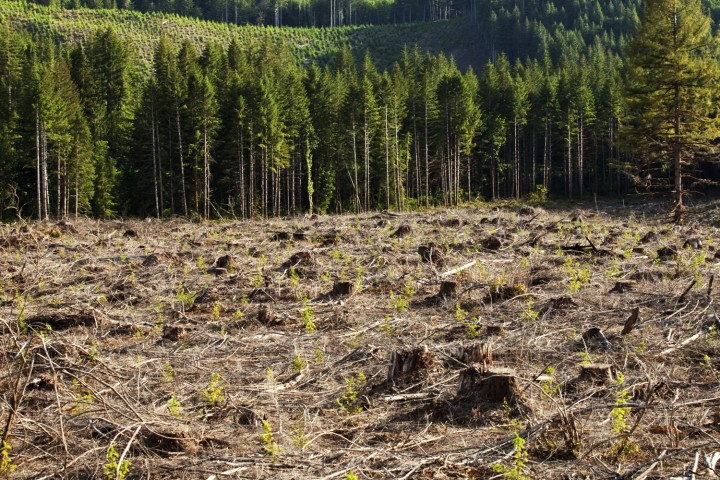Solutions to Deforestation

The causes of deforestation and degradation vary from region to region. In the tropics, agribusiness clears forests to make space for things like cattle ranching, palm oil and soy plantations for animal feed. Demand for wood products can threaten forests around the world, whether it is for throw-away paper products or hardwood flooring.
In too many parts of the world, ineffective or corrupt governments make things worse by opening the door to illegal logging and other crimes.
Solving Deforestation
Deforestation and degradation are a complex problems. While there are no silver bullet solutions, these approaches can make a big difference to save our forests.
The Power of the Marketplace
If corporations have the power to destroy the world’s forests, they also have the ability to help save them.
Companies can make an impact by introducing “zero deforestation” policies that clean up their supply chains. That means holding their suppliers accountable for producing commodities like timber, beef, soy, palm oil and paper in a way that does not fuel deforestation and has a minimal impact on our climate.
Companies should set ambitious targets to maximize the use of recycled wood, pulp, paper and fiber in their products. For the non-recycled products they buy, they should ensure that any virgin fiber used is certified by a third party certification system such as the Forest Stewardship Council.
But these corporations haven’t taken action on their own.
That’s why we’re investigating, exposing and confronting environmental abuse by corporations. Thanks to your actions, major companies are changing their ways and building solutions to protect jobs and our forests.
Learn more about what steps corporations like Kimberly-Clark, Nestle, and McDonald’s have taken to stop deforestation.
Standing with Indigenous Peoples
Forests around the world have been home to Indigenous Peoples for tens of thousands of years. Evidence shows that when Indigenous Peoples’ rights to traditional lands and self-determination are respected, forests stay standing. But too often, corporations and governments overlook or intentionally trample the rights of Indigenous Peoples.
For example, the Waswanipi Cree of Northern Quebec are fighting to keep the last wild forests on their traditional land intact, and the Munduruku people of the Amazon are battling a proposed mega-dam that threatens rainforests, a river, and their way of life.
Promoting Sustainable Choices
You can make a difference in the fight to save forests by making informed daily choices.
By using less stuff, eating sustainable food, and choosing recycled or certified sustainable wood products, we can all be part of the movement towards zero deforestation.
Using your voice to speak for forests matters, too. When people join together and demand forest conservation, companies and governments have to listen.
Changing the Politics
If we’re going to stop deforestation, we need governments to do their part.
That starts with cracking down on corruption and ensuring fair enforcement of forest conservation rules. Corruption fuels illegal logging and unsustainable forest management, which in turn can fuel organized crime or even armed conflict.
Beyond the rule of law, we need world leaders to embrace ambitious domestic and international forest conservation policies based on the latest science.
In the United States, laws like the Endangered Species Act, the Wilderness Act, the Lacey Act and the Roadless Rule help protect our forests and stop illegal wood products from entering the U.S. marketplace. We also support and use regional rules like the Amazon Soy Moratorium and global treaties like the Convention on International Trade in Endangered Species (CITES) to protect forests and the endangered species that rely on forest habitats.
Globally, we need commitments to reduce greenhouse gas emissions from deforestation in developing nations, especially those with tropical forests. Forests for Climate is one way to make that happen.
Forests for Climate is an innovative proposal for an international funding mechanism to protect tropical forests. Under this initiative, developing countries with tropical forests can make commitments to protecting their forests in exchange for the opportunity to receive funding for capacity-building efforts and national-level reductions in deforestation emissions. This provides a strong incentive for developing countries to continually improve their forest protection programs.
Take Action for a Deforestation-Free Future
If you’re ready to join the movement for a deforestation-free future, here’s how you can start:
- Make sure that the forest-derived products you buy are made from 100 percent post-consumer content materials.
- Make informed food choices. Eating a plant-based diet or reducing your consumption of animal products like meat and dairy can help save forests.
- Buy from companies that have a commitment to reducing deforestation through forest-friendly policies.
- If you are buying products made from virgin forest fiber, make sure that it bears a seal from a credible forestry certification system, like the Forest Stewardship Council.
- Educate your friends, family, and community about how our everyday actions can impact forests around the world.
Source : greenpeace.org
#1 Plant a tree. ... #2 Use less paper. ... #3 Recycle paper and cardboard. ... #4 Use recycled products. ... #5 Buy only sustainable wood products. ... #6 Don't buy products containing palm oil. ... #7 Reduce meat consumption. ... #8 Do not burn firewood excessively
